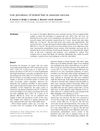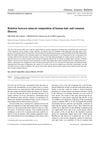 16 citations,
October 2015 in “Photochemistry and photobiology”
16 citations,
October 2015 in “Photochemistry and photobiology” Reducing copper (II) ion levels in hair can decrease hair damage.
 16 citations,
March 2007 in “The Veterinary clinics of North America. Food animal practice”
16 citations,
March 2007 in “The Veterinary clinics of North America. Food animal practice” Proper mineral supplementation in cow-calf operations prevents health issues and economic losses.
 16 citations,
June 2005 in “Clinical and Experimental Dermatology”
16 citations,
June 2005 in “Clinical and Experimental Dermatology” Twisted hair is rare in severe anorexia nervosa, found in only 2 out of 30 patients.
 16 citations,
November 1992 in “Journal of International Medical Research”
16 citations,
November 1992 in “Journal of International Medical Research” ViviScal®, a food supplement, was found to be highly effective in treating hereditary hair loss in young males, while fish extract showed no impact.
 15 citations,
August 2016 in “Current Urology Reports”
15 citations,
August 2016 in “Current Urology Reports” Nandrolone and oxandrolone could help treat male health issues like muscle loss and low testosterone.
 15 citations,
July 2012 in “Biological trace element research”
15 citations,
July 2012 in “Biological trace element research” Higher hair calcium to magnesium ratios and lower chromium levels in hair may indicate insulin resistance in Korean men.
 15 citations,
January 2010 in “Experimental Dermatology”
15 citations,
January 2010 in “Experimental Dermatology” Hair loss in certain young mice is linked to a specific gene and can be caused by lack of iron.
 15 citations,
August 2006 in “Journal of Cutaneous Pathology”
15 citations,
August 2006 in “Journal of Cutaneous Pathology” HIV-1 may cause increased stem cell death in hair follicles, leading to hair loss.
 14 citations,
September 2020 in “Clinical, cosmetic and investigational dermatology”
14 citations,
September 2020 in “Clinical, cosmetic and investigational dermatology” The hair serum significantly improved hair growth and reduced hair fall without causing any skin issues.
 14 citations,
March 2015 in “Clinical and Experimental Dermatology”
14 citations,
March 2015 in “Clinical and Experimental Dermatology” Human placental extract and minoxidil together significantly promote hair growth.
 14 citations,
January 2014 in “Journal of Cutaneous and Aesthetic Surgery”
14 citations,
January 2014 in “Journal of Cutaneous and Aesthetic Surgery” Scalp Roller therapy helped improve hair growth in patients with hard-to-treat alopecia areata.
 14 citations,
October 2012 in “Clinics in Plastic Surgery”
14 citations,
October 2012 in “Clinics in Plastic Surgery” Adding stem cells to fat grafts for facial rejuvenation might improve outcomes, but more research is needed to confirm safety and effectiveness.
 13 citations,
July 2022 in “Frontiers in cell and developmental biology”
13 citations,
July 2022 in “Frontiers in cell and developmental biology” Tiny natural vesicles from cells might help treat hair loss.
 13 citations,
May 2017 in “Dermatologica Sinica”
13 citations,
May 2017 in “Dermatologica Sinica” Dengue fever can cause a temporary type of hair loss called telogen effluvium.
 13 citations,
January 2017 in “Molecules”
13 citations,
January 2017 in “Molecules” Compounds from Alpinia zerumbet may help with hair regrowth and cancer treatment by targeting PAK1.
 13 citations,
February 2016 in “Clinical Medicine”
13 citations,
February 2016 in “Clinical Medicine” The document concludes that diagnosing and treating hair loss is complex and requires understanding its psychological effects and underlying causes, while also calling for more research and new treatments.
 13 citations,
November 2013 in “Seizure: European Journal of Epilepsy”
13 citations,
November 2013 in “Seizure: European Journal of Epilepsy” Levetiracetam may cause hair loss, which can potentially reverse with lower doses or stopping the drug.
 13 citations,
January 2011 in “Lung India”
13 citations,
January 2011 in “Lung India” Stopping isoniazid can reverse hair loss caused by the drug.
 12 citations,
July 2021 in “Scientific Reports”
12 citations,
July 2021 in “Scientific Reports” Glutamic acid helps increase hair growth in mice.
 12 citations,
November 2017 in “Archives of Dermatological Research”
12 citations,
November 2017 in “Archives of Dermatological Research” Mediterranean diet with fresh herbs and vegetables lowers male hair loss risk.
 11 citations,
July 2021 in “Nanomaterials”
11 citations,
July 2021 in “Nanomaterials” Wound covers with α-13'-COOH from vitamin E can improve and speed up wound healing.
 11 citations,
February 2019 in “Journal of Cosmetic Dermatology”
11 citations,
February 2019 in “Journal of Cosmetic Dermatology” Low zinc and biotin levels linked to male hair loss; supplements may help.
 11 citations,
January 2017 in “Evidence-based Complementary and Alternative Medicine”
11 citations,
January 2017 in “Evidence-based Complementary and Alternative Medicine” DA-5512 effectively improves hair growth and health, performing better than minoxidil.
 11 citations,
November 2015 in “Journal of Functional Foods”
11 citations,
November 2015 in “Journal of Functional Foods” Hibiscus petals improved blood sugar and stress responses in diabetic rats.
 11 citations,
September 2012 in “Chinese science bulletin/Chinese Science Bulletin”
11 citations,
September 2012 in “Chinese science bulletin/Chinese Science Bulletin” Hair mineral content can help diagnose certain common illnesses.
 11 citations,
September 2007 in “Advances in therapy”
11 citations,
September 2007 in “Advances in therapy” INVERSION Femme supplement helped women lose weight, reduce hair loss, and improve skin and nail health.
 11 citations,
January 2004 in “Exogenous dermatology”
11 citations,
January 2004 in “Exogenous dermatology” Outside factors like grooming, chemicals, and the environment can damage hair and cause disorders.
 10 citations,
January 2021 in “Journal of Ginseng Research”
10 citations,
January 2021 in “Journal of Ginseng Research” Red ginseng oil may help grow hair and protect skin from UVC light.
 10 citations,
June 2016 in “Wound Repair and Regeneration”
10 citations,
June 2016 in “Wound Repair and Regeneration” The microenvironment, especially mechanical forces, plays a crucial role in hair growth and could lead to new treatments for hair loss.
 10 citations,
February 2007 in “Current Opinion in Endocrinology, Diabetes and Obesity”
10 citations,
February 2007 in “Current Opinion in Endocrinology, Diabetes and Obesity” Low birthweight and rapid weight gain after birth may increase the risk of developing polycystic ovary syndrome.






























